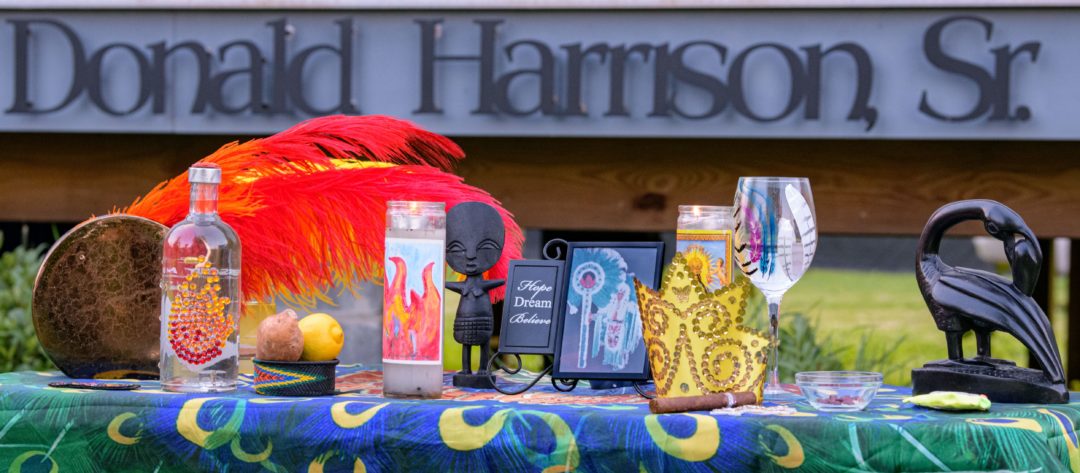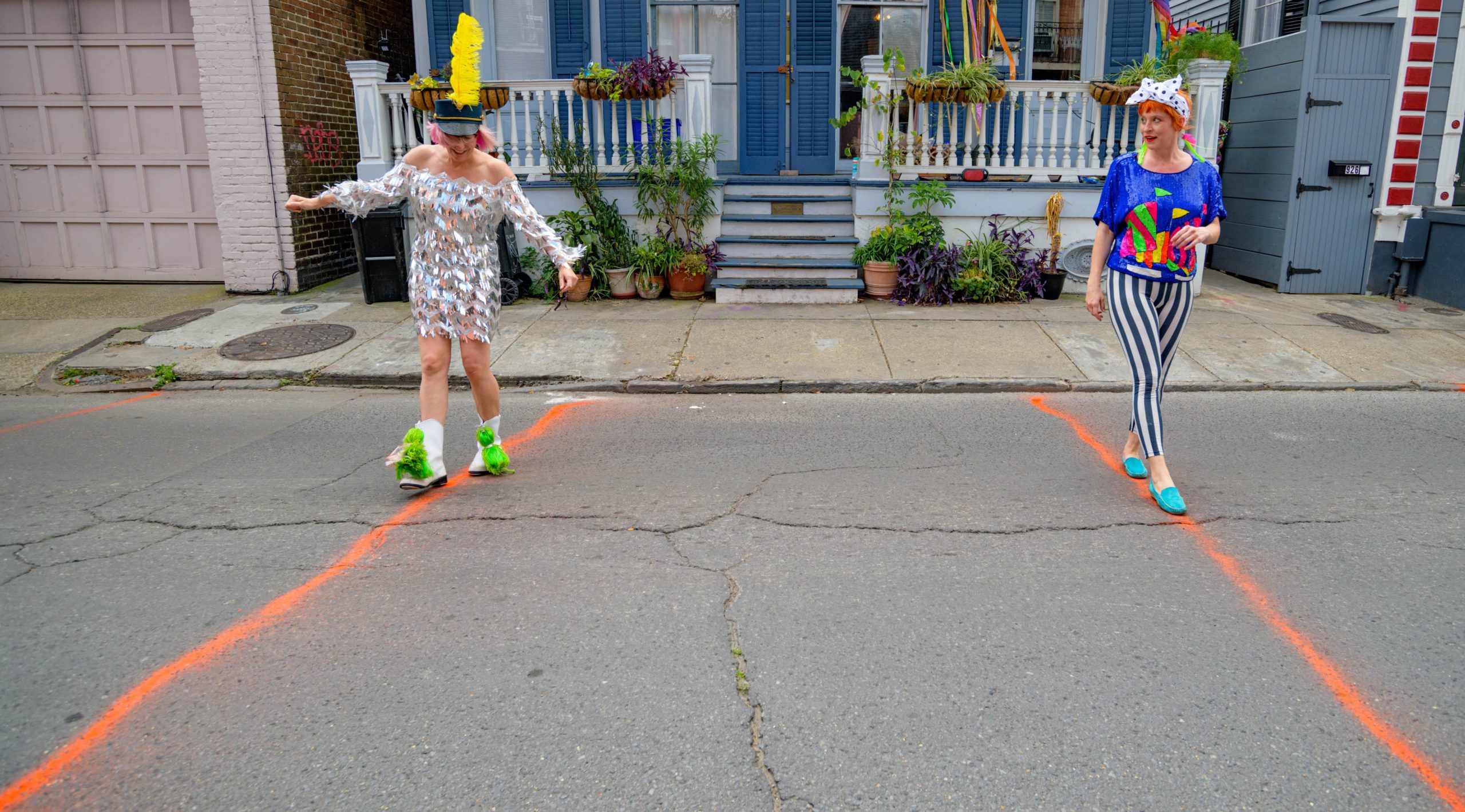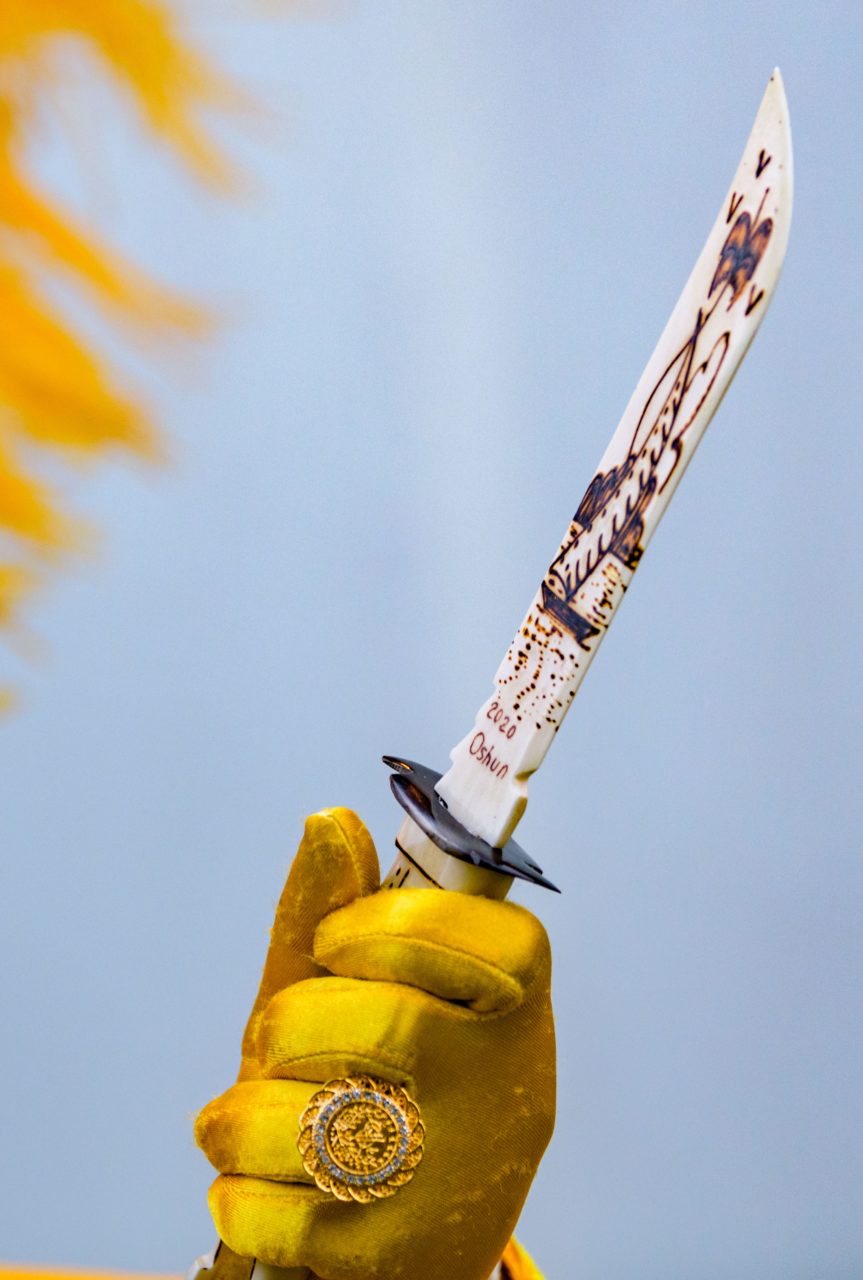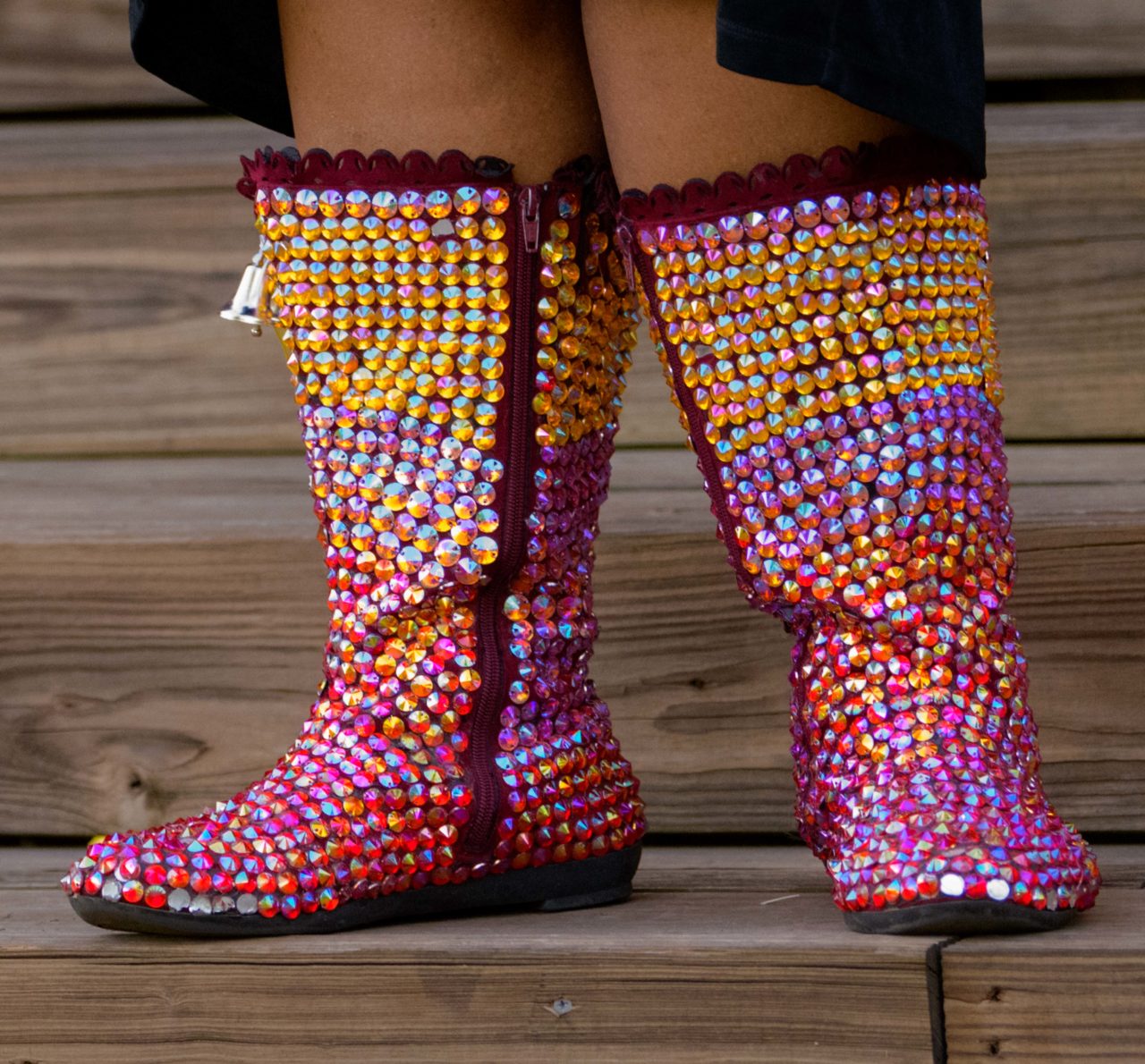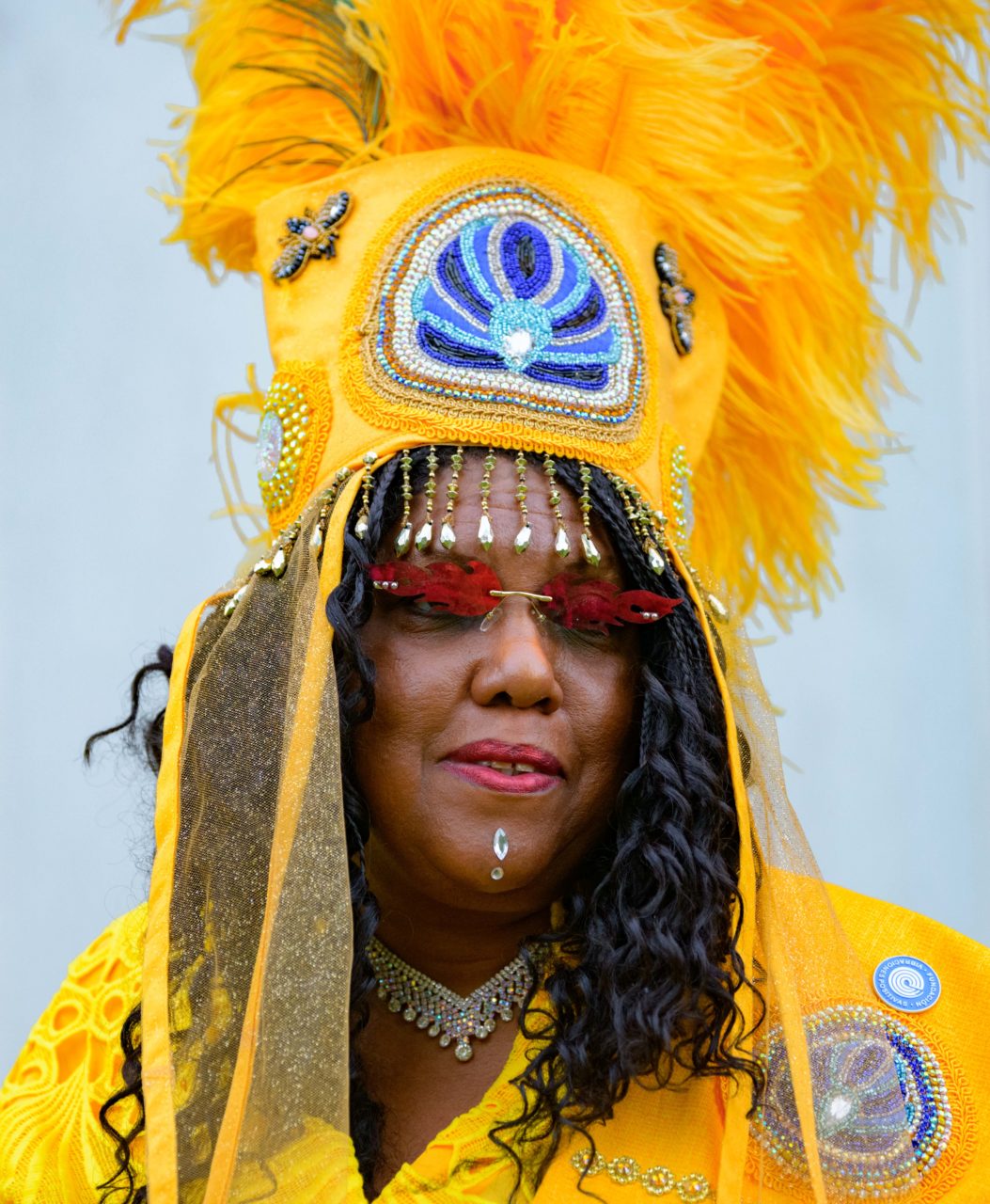It looks like closing time at Buffa’s Bar and Restaurant as Davis Rogan plays piano next to empty tables and chairs stacked upside down and their legs exposed to the empty air on St. Joseph’s Night, Thursday, March 19, 2020. There is no audience except for a webcam streaming his comedic and occasionally dark-humored songs from his life in Treme and other neighborhoods of New Orleans.
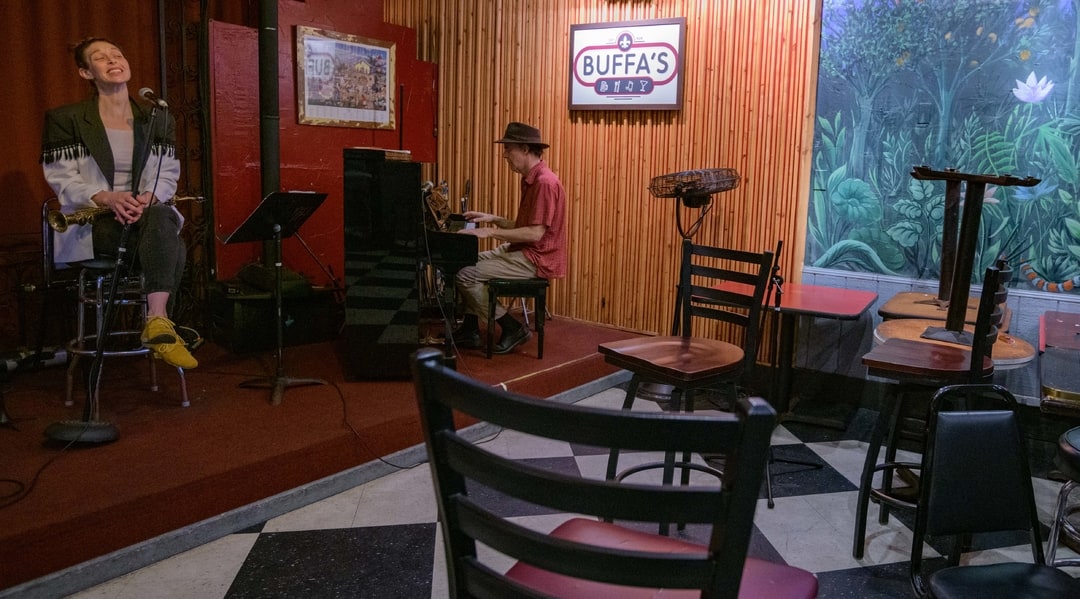
Owner Chuck Rogers sits at an empty bar working on his laptop and a tablet, looking at what remains of his business after the mayor, governor, and President declared states of emergency because of the novel COVID-19 pandemic, leaving local bars and restaurants closed except for pick-up and delivery orders.
With few orders coming in that night, Buffa’s cook Yoany Carrion sits alone on a bar stool outside and gently picks his banjo in the cool night.
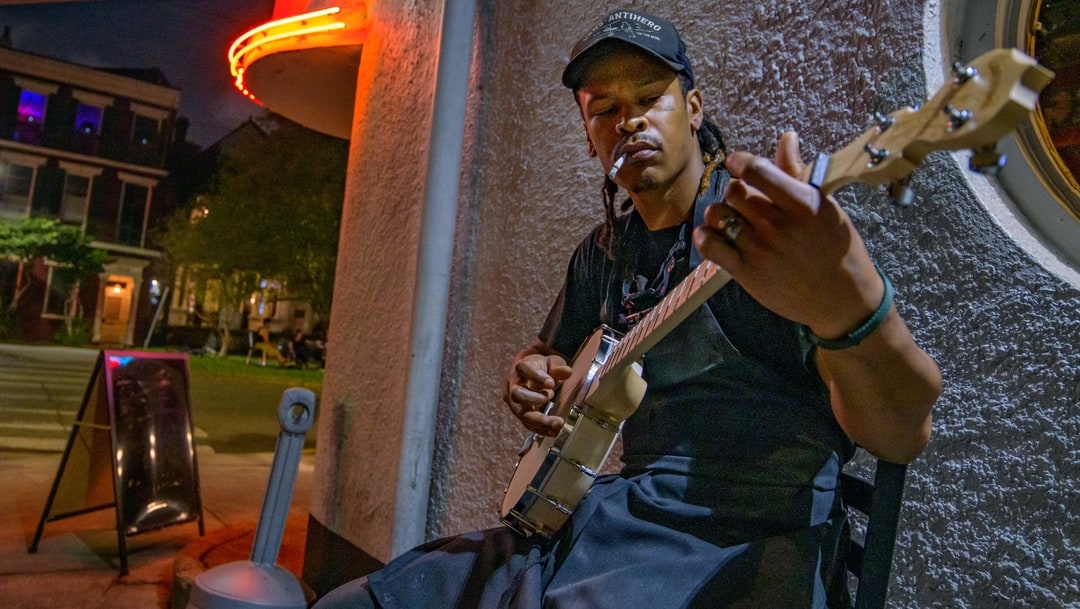
The chairs inside are all empty save one. Davis Rogan plays “You and Me” a ballad dedicated to his wife Stephanie, who sits quietly alone next to upside down tables. The couple will soon be married seven years. He has peeled some shrimp from Westwego for their anniversary, “I’ve got a nice dinner in the freezer in case we’re locked down on Monday. Otherwise, I’ll go out and score some fish. I have a good hookup for some drum, so, I’m gonna cook fish and that’s going to be all right.”
As his set winds down, fellow piano-player and songwriter Tom McDermott arrives and presses out two big squirts from a large bottle of hand sanitizer. After cleansing, McDermott waves both hands to say hello and to show off that the hands are clean. Singer and saxophonist Aurora Nealand, who is joining McDermott on the next set, follows McDermott by dutiful cleaning her hands with the sanitizer.
After Rogan finishes his set, Buffa’s music coordinator Leslie Cooper uses sanitary wipes to clean off the piano keys making a strangely melodic chromatic scale as she wipes down each white and black key of the piano from the highest note to the lowest. “I was trying to think of way to help out my musicians,” said Cooper who organized the streaming and put the word out. “Musicians started texting me and now 25 want to do it.”
On the website, Cooper has setup a way for people to tip the performers and bands or donate to a general fund for Buffa’s employees that have been furloughed because of the coronavirus closures.
Guardians of the Flame
Nearby in the Upper 9th Ward, Mardi Gras Indian Maroon Queen Cherice Harrison-Nelson arranges an altar on St. Joseph’s Night at home to honor her father, the late Guardians of the Flame Big Chief Donald Harrison, Sr. The Indian gangs traditionally come out at night on St. Joseph’s Day and roam the city, but the event was canceled. She says “Corona, you ain’t stopping nothing, you just slowing us down a little bit. We’re gonna come back bigger, better, and stronger in two-thousand and twenty-one.”
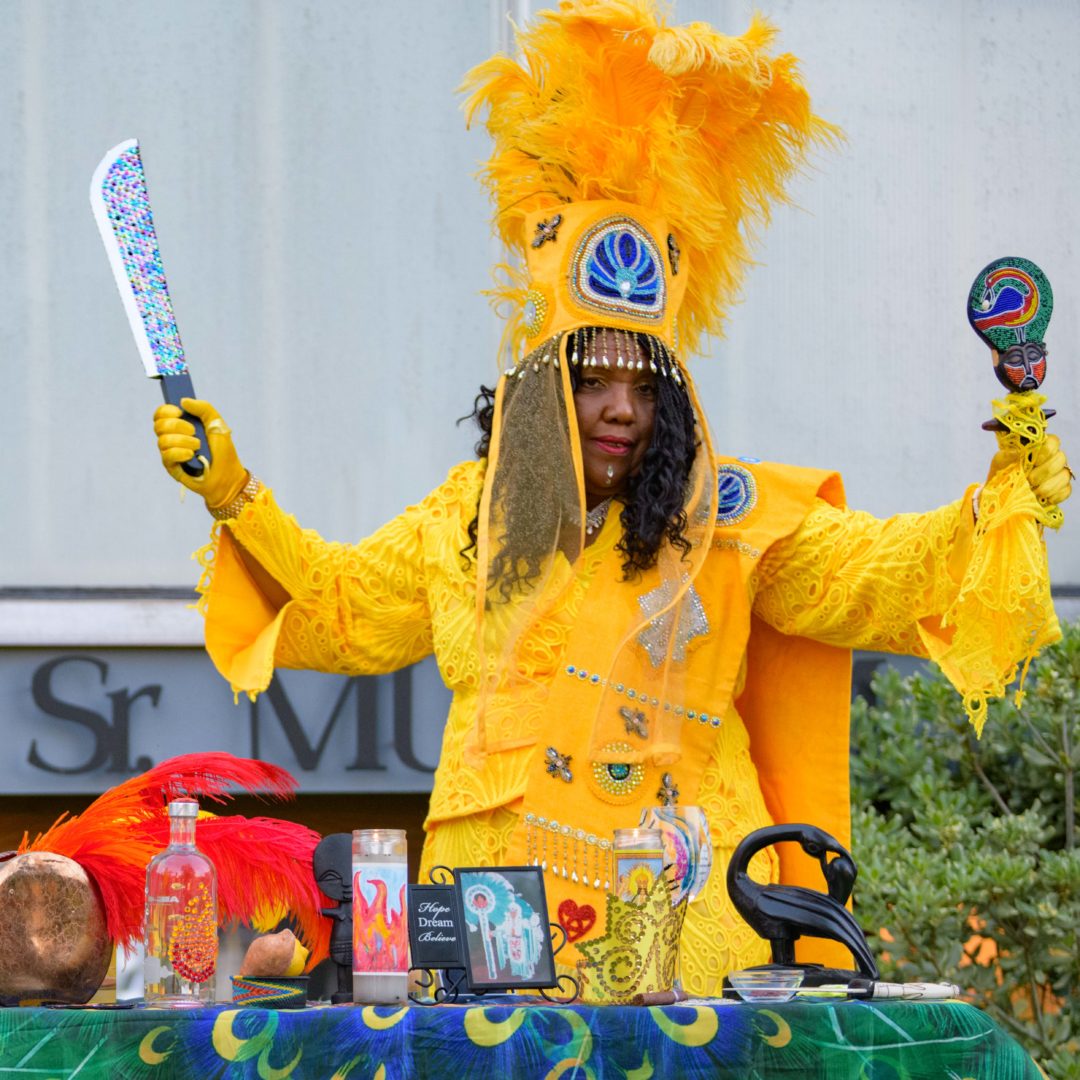
Dressed in yellow with a feathered hat and a beaded sash, she pours libations and lists names of ancestors including other Big Chiefs and Big Queens, eventually going all the way back to an ancestor named Madison, who was stolen and enslaved at age 11.
Harrison, Sr. was a former Big Chief for the Creole Wild West Indians gang. This group is believed to be one of the first Mardi Gras Indian gangs founded in 1885 by Becate Batiste, a Seventh Ward Creole of African-American, French, and Choctaw heritage. The title Maroon Queen honors “maroons,” who escaped slavery plantations in Southeast Louisiana and mingled with local Native American tribes. Her beaded and jeweled machete is a symbol for the maroons who used it to cut through the brush and for protection. “I stand on the shoulders of giants. They are our giants. I embrace my ancestral homeland of West Africa.” Despite the cancellation she was still able to honor her father by staying home and practicing social distancing
Safety Dancing in the Streets
In the French Quarter, two adventurous ladies who call themselves the Traveler Broads, measured ten feet of social distance between them and drew orange lines on the street and began line dancing. The dancing novices incorporated elbow coughing into their routine as they danced to Men Without Hats’ “The Safety Dance,” and “Don’t Stand So Close To Me” by The Police. Keeping a ten-foot distance, neighbors sometimes join in the dancing.
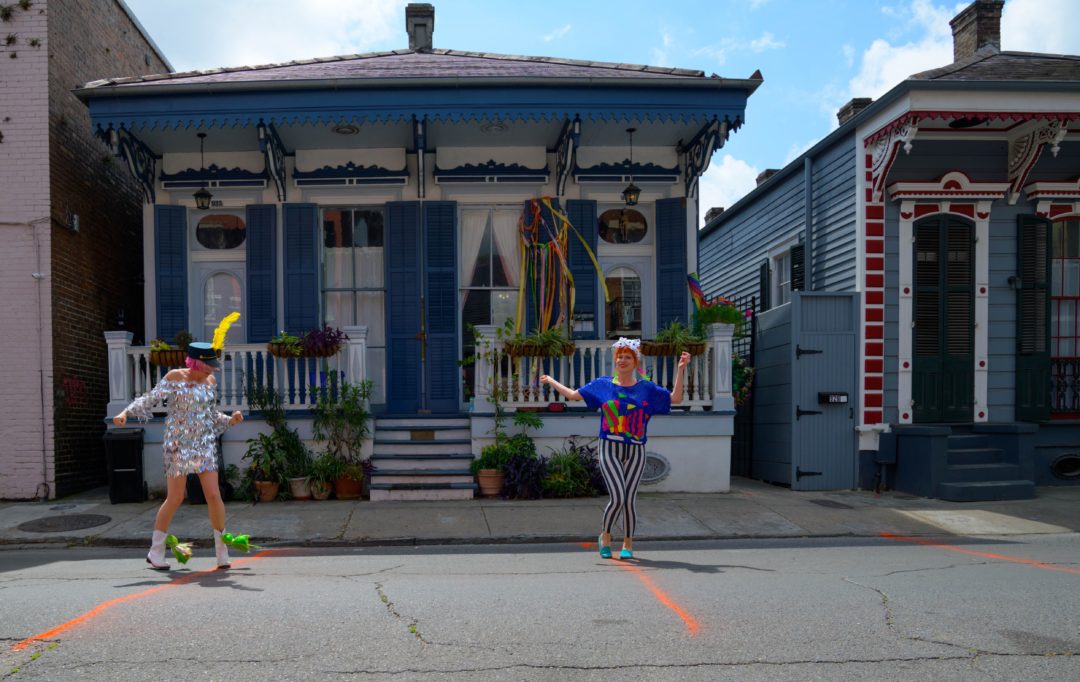
The duo travels around the world and writes and photographs their adventures in blogs, published articles, and their guidebooks. But they also focus on all things authentically New Orleans including the growing drag queen scene.
Photojournalist Kerry Maloney wears white majorette boots with giant green tassels and a shiny chrome flapper dress topped with pink-colored hair and a soldier’s hat with a big yellow ostrich feather. Dancing ten feet away is Jessica Fender wearing a blue and clownfish sequined blouse with black and white striped pants and a big white bow with black polka dots in her bright orange hair. Maloney’s tan-colored dog, Dorothy looks, amused through the front window after she was painted with glamourous-looking black eyebrows for a dog drag show.
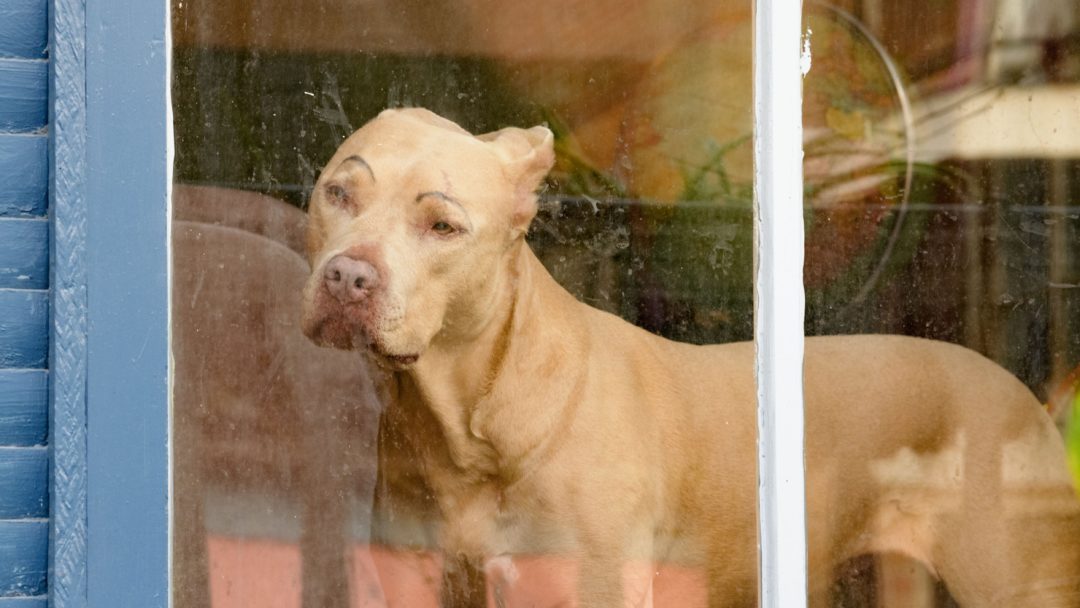
Maloney explains, “seeing everything boarded up right now is surreal.” Normally the Quarter would be filled-up for the Italian-American St. Joseph’s Parade. Walking parade clubs hand out silk flowers in exchange for kisses to celebrate the Catholic feast of Saint Joseph, the Virgin Mary’s husband. Despite the surrealness, Maloney said, “people are being very kind to each other. I feel very lucky to be able to live in such close proximity to people, while still being able to keep a safe distance. We all need each other right now.”
Their next-door neighbor watches the dancing from behind green shutters while in precautionary quarantine because a co-worker tested positive for COVID-19. She gets a food delivery and tells the bicycle delivery lady to leave the food on the front steps so they don’t come in contact. After leaving the food and taking the receipt the delivery lady shouts “fifty dollar tip! Yes,” as she rides down the street past the dancing duo.
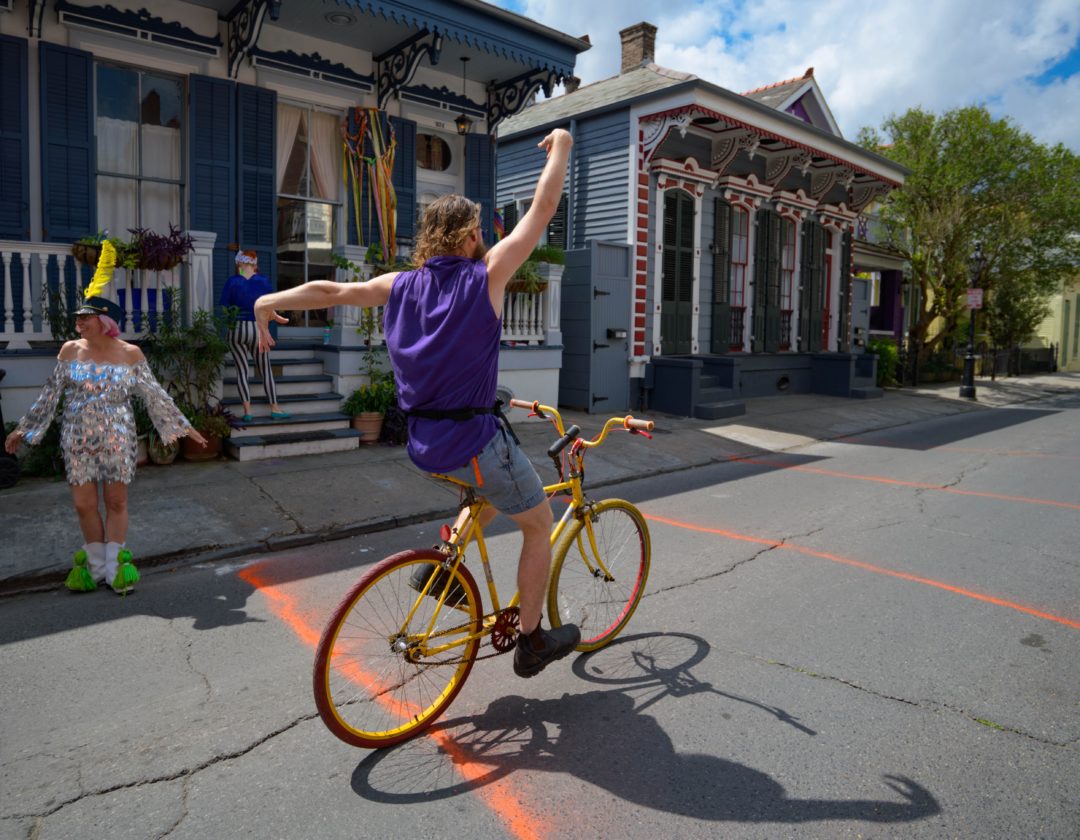
As part of her travel writing, Fender went on a 4-day mindfulness and yoga retreat in Cheaha State Park in Alabama, the week before. “As the rest of the world went from ‘business as usual’ to complete pandemic shutdown, I was learning to meditate and be mindful in a lodge in a quiet corner in Alabama. Honestly, the timing couldn’t have been better. I missed most of the initial panic and came back with some really useful tools for self-care,” Fender explained, “the dancing sort of continues that theme of mindful community. We are keeping our distance and intentionally trying to bring people together in a way that’s safe and uplifting.”
Quarantine Cabaret
In Faubourg Marigny, burlesque performer Trixie Minx copes with the lack of audiences by livestreaming from her bathtub. On St. Joseph’s Night, she posted a picture of herself in the tub with a giant rubber ducky. In “Tub Time with Trixie,” she posts flirtatious and comedic clips online including proper handwashing techniques while wearing glittering jewels, a sparkly dress, and a tiara. “Currently I’m doing my best to spread awareness regarding helpful resources and positive energy through my social media,” she said.
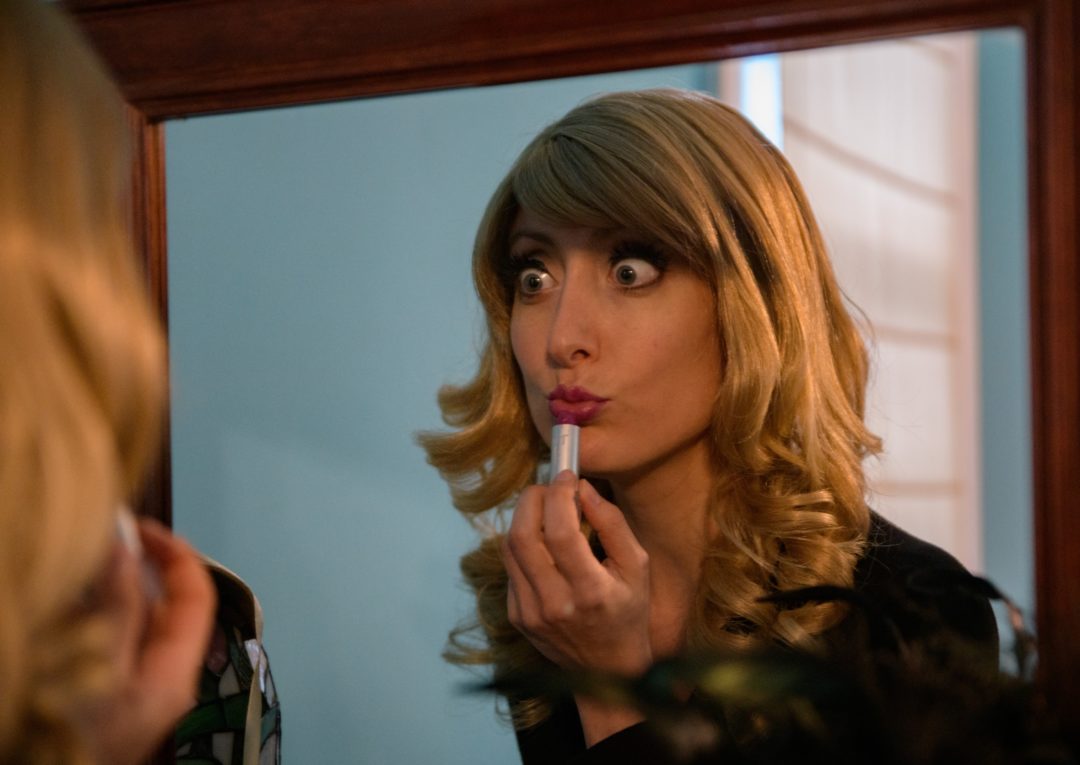
Later in the week, a collaboration called @Quarantine.Cabaret debuted on Instagram, hosted by Los Angeles based neo-burlesque performer Michelle L’Amour. With the hashtag #TheShowMustGoOn, the idea was launched in 96 hours. The shows are free but viewers are encouraged to tip. In the first episode L’amour states “Many of us including myself have all lost our jobs and we have no income. So, if you are not as financially impacted by this pandemic as we are, please be generous. Hopefully we can dance another day.” In the first episode Trixie performs a burlesque routine in her living room while she sprays a chair with disinfectant and playful wipes it down with paper towels. Her dog Zeus looks on, and acts as a stand-in for an audience by holding some of her discarded garments. The episode also features a singing performance and magician’s act by other cabaret performers.

Trixie has also put together “Just the Tips!” an online listing of local performer’s Venmo accounts. “We only add performers that give us permission. But if any burlesque / boylesque / drag artist would also like to be added, they just need to email their stage name & Venmo account.”
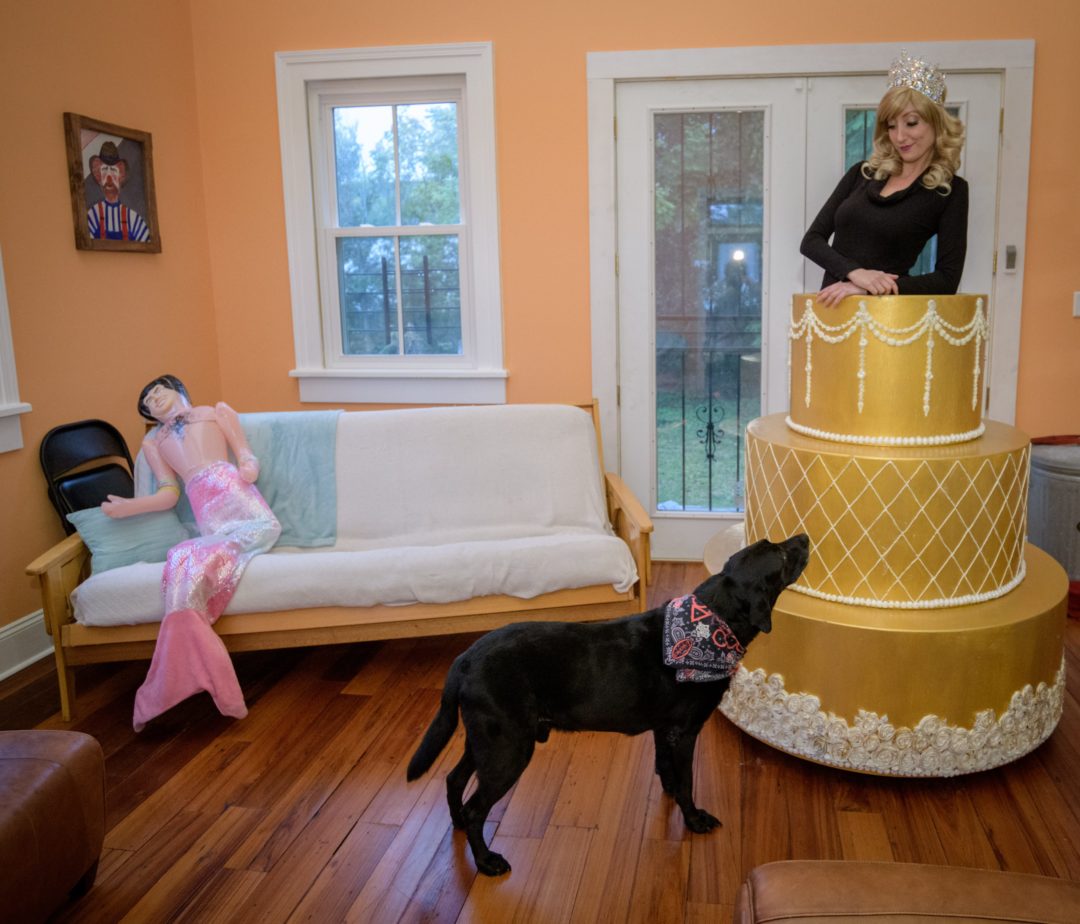
The new audience
Back at Buffa’s, musician Tom McDermott said he had never played for an empty room, “it was pretty strange having no applause. On the other hand, we could hear ourselves much better because all the equipment was turned off, all the kitchen noise was gone, there was no noise. We both enjoyed that. And Aurora being a theatrical person she enjoyed it. She read poetry and made comments to the camera, which was fun. People evidently enjoyed it.”
While the empty room was odd, McDermott said the strangest gig he ever did was wearing a horse’s head for the Mardi Gras episode of HBO’s “Treme” as he played “Camptown Races” on piano.
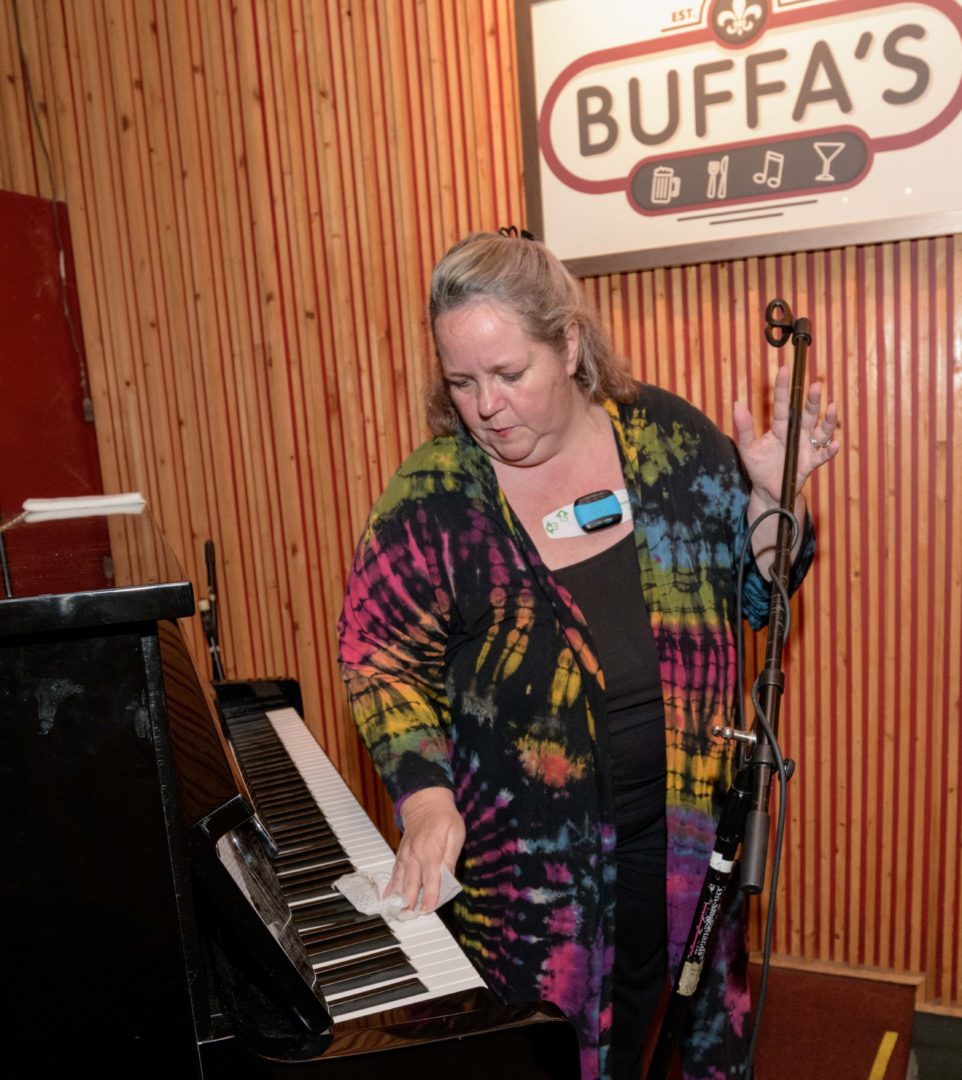
Since moving to New Orleans from St. Louis in 1984, McDermott has a long tenure in jazz and rhythm and blues bands including the New Orleans Nightcrawlers and the Dukes of Dixieland. But he couldn’t remember a time more difficult than now, “even after Katrina, you could go somewhere else and play. New Orleans musicians were in demand. Now, you can’t go anywhere and can’t travel anywhere. It’s a uniquely bad situation.”
McDermott described what he missed from a live audience, “you get energy, you get applause. Even if people aren’t into it, you get a bad energy, but that’s an energy too. But at Buffa’s, we’ve been there a long time and have a good fan base.”
McDermott still seems hopeful saying, “the best experiences for me have been composing music, and I haven’t done much of that lately. Music really can transport you and make you just absolutely forget your cares. I’m hoping that this enforced homestay will jiggle my mind into composing.”
Rogan also plans on composing, “I am thinking of writing some stuff that’s brand new and topical. But today, I was trying to play my usual set. To maintain normalcy, that’s what I do.”
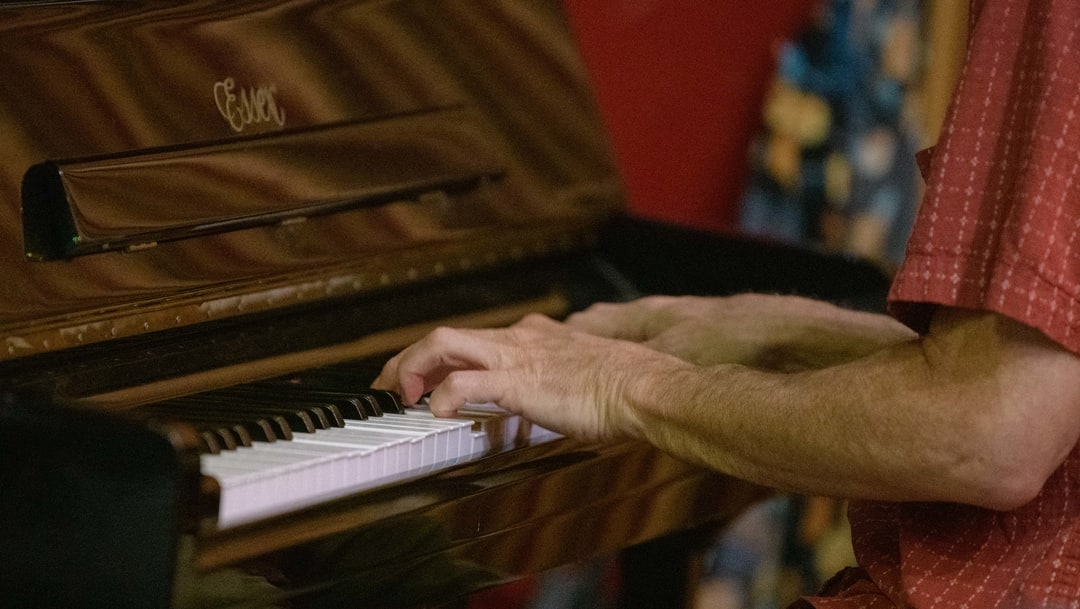
The usual set includes songs about Rogan’s life that were the inspiration for the character Davis McAlary, a disc jockey in HBO’s “Treme” series. Rogan was a consultant and appeared on the television show about the changes in the city post-Katrina. “During Katrina, we were the only area of the country that was dealing with an issue. And this is a global pandemic. It’s a whole another ball of wax really. God only knows, we’re only just looking at the beginning of income loss, but it’s going f—ing suck for a minute, that’s for sure.”
But Rogan said, “Katrina was a big, bad thing but we lived through it. I know for some people; it’s giving them PTSD and I totally understand that everybody has a right to their feelings. But from a personal aspect I feel a little better prepared to deal with [the pandemic] having had to live through Katrina.”
“I play music because I love it and I couldn’t do anything else. I really do enjoy reaching an audience and making people feel happy. There’s no reaction like seeing stuff you’ve written that someone’s bothered to memorize and sing along, or seeing someone hear it for the first time and the song is landing [with them]. I’m looking forward to getting back to the same old s–t, hopefully sooner than later.”
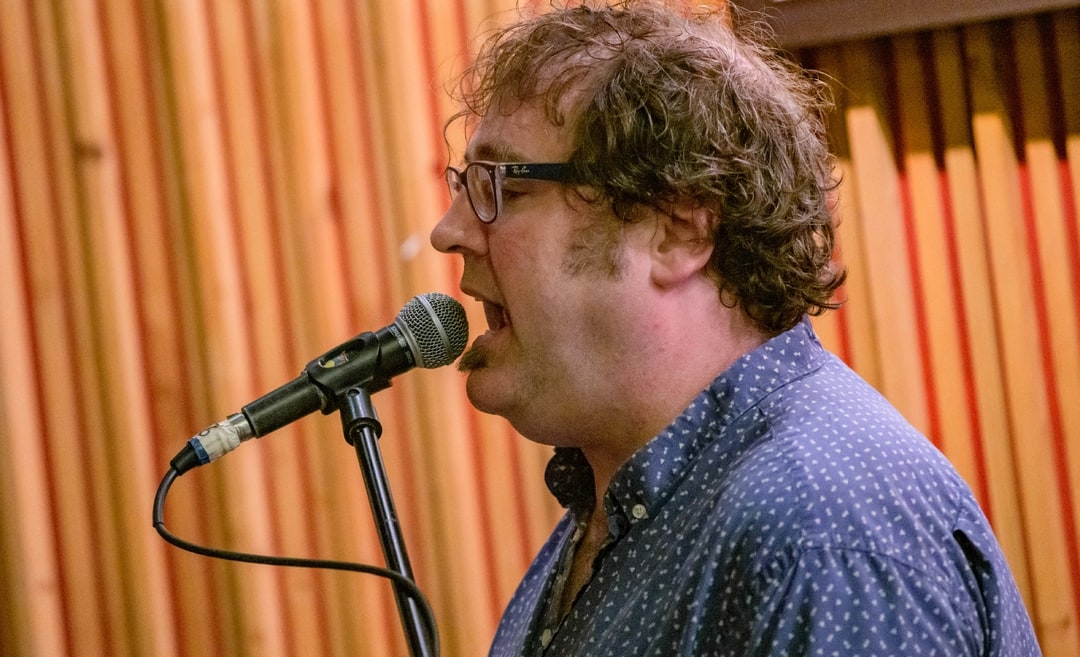
At the Altar
Back in the 9thWard, Queen Harrison-Nelson gathers items for the altar that her father liked including sweet potatoes, a cigar, a bottle of vodka decorated with a flame, and intersperses them with carvings of Oshun, a queen in the West African Yourba religion associated with water, purity, sensuality, and love. She also included items honoring her Catholic faith and community including a crucifix, and a candle for the blessed mother. Like the city of New Orleans, Mardi Gras Indians are a combination of distinct cultures and faiths, but together they combine into something wholly unique and enduring. Acting as a guardian of the flame, the Maroon Queen raises her machete and proclaims “We won’t bow down to Corona, don’t know how.”
